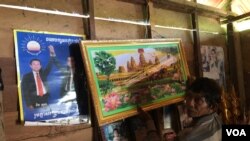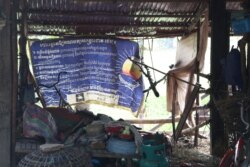To protect her family, Him Taing Or lied to local authorities that she and her husband had divorced.
Her husband, Oun Srean is a deputy head of the opposition Cambodia National Rescue Party (CNRP) in Cambodia’s northwest Uddar Meanchey province, on the border with Thailand.
To protect his family, Oun Srean fled Cambodia when Cambodia’s Supreme Court in November 2017 dissolved the CNRP, which represented a growing challenge to Hun Sen, the prime minister for more than three decades. His ruling Cambodian People’s Party (CPP) oversaw a purge of more than 5,000 local CNRP representatives who lost their positions after the party’s dissolution. They were banned from political activity.
The result was that after billions of dollars spent in international effort to build democracy in Cambodia since the early 1990s, Hun Sen won all 125 seats in parliament in the July 2018 national election, and now enjoys an increasingly authoritarian one-party rule.
And for the past month, the Hun Sen government has been doubling down on CNRP supporters because the self-exiled opposition leader Sam Rainsy announced on August 18 that he plans to return to Cambodia on November 9. The official position is that this amounts to “plotting a coup.” The government has made clear that that anyone who supports Rainsy will face legal action.
Dozens of opposition members have been arrested since Rainsy’s announcement. Local TV news programs, all on stations controlled by the government or its allies, feature file footage of demonstrations against Hun Sen in 2013, when the opposition questioned election results that kept him and the CPP in power.
In Cambodia, where 1.7 million people died between 1975 and 1979 as the Khmer Rouge attempted to create a Marxist agrarian paradise, there’s a wariness of anything that might trigger instability. The TV footage in regular rotation shows government forces keeping the peace by shooting water cannons at the protestors.
Soeung Sen Karona, a spokesman for the Cambodian human rights group Adhoc, which has followed the threats against the opposition, said the situation has worsened since Sam Rainsy’s announcement. Adhoc has received written and verbal complaints from activists who have fled and from their families. “Activists and supporters are now scared,” said Soeung Sen Karona.
Police visit
Before the government dissolved the CNRP, “Police came to my house several times,” said Him Taing Or. “So, I told them I have divorced [my husband],” she told VOA Khmer in a recent interview at a restaurant in Anlong Veng, a onetime Khmer Rouge stronghold now best known as the gravesite of Pol Pot, the regime’s mastermind who died in 1998.
“I went to Thailand to live with my husband for a while in July 2018 and then came back in November,” said Him Taing Or, 47, the mother of two children.
“I told local authorities a year ago that I have divorced,” she said.
Him Taing Or, who earns about $5 a day packing rice cookies made in her village, is afraid of giving an interview at her home because she believes she is under surveillance by local authorities.
Oun Srean has been a wanted man since October 7 when he was charged with “plotting” because he backed Sam Rainsy’s return. Him Taing Or found out authorities has issued an arrest summons for her husband when her father called with the news.
“I am worried that he will be arrested and jailed,” she said, knowing that the Uddar Meanchey provincial municipal court asked local police to arrest him.
Oun Srean is just one of dozens of activists who have been charged with “plotting.”
The opposition activists arrested this month and who have been charged with “plotting” face prison terms of up to 10 years if found guilty. Others are in hiding or have fled the country.
“The political situation is still dire for the opposition in Cambodia,” said Ear Sophal, an associate professor in diplomacy and world affairs at Occidental College, Los Angeles, California. “Phnom Penh loves power and money more than freedom and democracy.”
Unafraid activist
Chhun Vean, a former deputy CNRP commune chief from the Kdey Run commune in Siem Reap province, now works in construction in Thailand. “I am not scared or willing to stop my work for democracy in Cambodia,” he said.
The Siem Reap provincial court issued a summons dated October 8 for the opposition activist in Pouk district’s Kdey Run commune. VOA obtained a copy of the summons.
Chhun Vean joined a precursor to the CNRP in 2008, a year marked by CPP-dominated national elections. He became active in commune politics. “That is why they want to intimidate me, to stop me.”
“Cambodia’s courts are a tool politicians use to threaten their opponents,” said Chhun Vean, the 30-year-old father of a six-year-old daughter and a two-year-old son. His wife is with him in Thailand, and the children are with their grandparents in Cambodia.
The summons allows him to confess. If he does, he will be released and the charges dropped.
The government has been making good on this promise. When Seng Sokhun, a former CNRP commune chief in Phnom Penh, confessed on video on October 10, the government dropped charges. Local media featured the story which lit up social media.
On Friday, as VOA spoke with Chhun Vean’s 67-year-old father Chek Chhun, police vehicles drove by his house in Tapang village of Siem Reap province’s Pouk district’s Kdey Run commune.
“They may come and question me,” said Chek Chhun, who was once active in the opposition and now worries about his son. “There are no equal political rights. I don’t know what to say now.”
More arrests threatened
Hun Sen has threatened to deploy the military if CNRP leaders and supporters return from exile with Sam Rainsy. On Monday, he threatened to arrest opposition activists living in Thailand.
“Those who are in Bangkok, it is not certain that you will be safe,” he said. “I will arrest and bring you all back.”
His threat is not empty. Cambodia and Thailand signed an extradition agreement in 2001, and Thai authorities have handed over opposition activists in the recent past.
"Under the military guided government of [Prime Minister] Prayut Chan-ocha, it’s clear Thailand is no longer safe for opposition activists,” said Phil Robertson, deputy director of the Asia division of Human Rights Watch in an email.
“There’s no doubt Thailand is prepared to sell or barter Cambodian asylum seekers and refugees in exchange for favors from Phnom Penh," he added.
The Thai government did not respond to a request for comment.
Mork Vanvuthy, a former CNRP council member in Bansayrak commune, is also wanted by Hun Sen’s government and living outside Cambodia.
“I have not done anything illegal. We expressed our opinion,” said Mork Vanvuthy, 47, adding that if he remained in Cambodia, “I would die or be jailed.”
Sok Thai, 37, a villager in Cambodia’s Kampong Thom province, said her husband, Nou Phoeun was arrested early in September because he expressed his political opinions and criticized the government about the price of rice in their neighborhood and online. Three other Kampong Thom province activists were arrested at the same time, she said.
Increased violence
Human rights advocates are concerned that more activists will be arrested and violence against CNRP sympathizers will increase as Rainsy’s return date nears.
"Cambodia is intensifying its campaign of repression against CNRP activists because they want to prevent the return of Sam Rainsy and the other senior CNRP leaders in exile,” said Robertson. “It’s likely it will get even worse the closer we get to November 9."
On September 22, Sam Rainsy’s bodyguard, Pouk Chanda, was beaten on a Phnom Penh street. He suffered head injuries.
Sim Bona, a former CNRP commune chief in Phnom Penh’s Koh Dach commune was attacked September 25 by an unidentified man wielding an iron pipe.
“They tried to beat my head but I had a helmet,” he told VOA Khmer at his home in Koh Dach commune the day after the assault. Sim Bona, 59, defended himself at a cost: the attacker broke his left arm in three places.
Others in the opposition told VOA the beatings may have been a form of political retribution or intimidation.
Phay Siphan, a government spokesman, said making accusations against the government is the CNRP “culture.”
“Whenever there are victims, [they say] it is political,” he said. “I don’t want to have a prejudgment. Let’s wait for the investigation.”
Back in Anlong Veng, Him Taing Or, who takes herbal medicine daily for diabetes and high blood pressure, is hopeful that her husband will be able to return without fear of arrest or jail.
“Life is difficult since we are separated,” said Or. “I hope that my husband can come back and we live together.”





